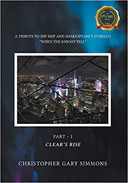
 |
A Tribute to Hip-Hop and Shakespeare's Othello "When the Knight Fell" Part - 1: Clear's Rise
by Christopher Gary Simmons
Writers Republic
Adhering closely to the essence of Shakespeare's Othello, Simmons' adaptation transports the play's enthusiasts into its modern-day rendition revolving around Clear S. Waters and similar themes of love, jealousy, conspiracy, friendship, and loyalty. All this is done while tackling socioeconomic conundrums and the music scene's social commentary (and interconnected street life) of Manhattan in the late '90s.
A clear ode to the classic tragedy, the work intends no subtlety when it comes to making parallels, particularly with character creation. For instance, Othello's central love interest, Desdemona, bears striking similarities in name and action with Diamond, while Iago and Ego are similar in their merciless desire to stoke division. Though the premise is similar in that Clear secretly weds his prominent love interest (in turn igniting a chain reaction with far-reaching consequences), the delivery is incredibly unique. Rather than committing to iambic pentameter, Simmons employs a fusion of hip hop and experimental verse to deliver a unique lyrical experience that is likely to appeal to modern readers.
Similar to how Iago becomes enraged when Othello promotes Michael Cassio, Ego is determined from the start to play a chess game that ultimately ends up in Clear's downfall and the street empire falling into his own lap. Reeling in Ar (Roderique), whose character is inspired by Shakespeare's Rodrigo, Ego plants the seeds of doubt in the mind of Diamond's father, Tio, which leads to a meeting of power players in music mogul Duke's conference room. In the Shakespearean spirit, the group is attempting to discern whether the love between Clear and Diamond is pure or one fueled by lust and conniving trickery. Almost single-handedly, Ego and Ar instigate planned chaos and contentious relationships among many of the primary characters, beginning with Tio's utter disdain for Diamond's decision to marry Clear.
With many adaptations of Othello now in print, what makes Simmons' work a meaningful read is his ability to keep the audience engaged with his experimental and modern poetry style while consistently referencing Shakespear's play in timely situations. For instance, during a tense conference-room situation where Clear showcases just how strong of a character he is in proving his love for Diamond, Duke plays the Duke of Venice's role. His main purpose seems to be a platform to unify Tio and Clear. Specifically, he quotes from Othello, stating, "The robbed that smiles, / Steals something from the thief; / He robs himself, that spends a bootless grief."
With direct references to the Shakespearian tragedy, Simmons' work is undoubtedly a tribute that seeks to create awareness for the original work and its evergreen ability to stay relevant regardless of the time or the setting. Even the theme of war is prevalent with the constant use of generals in moving the "rock" on the streets. At the core of both works is a continuous entanglement between love, loyalty, and war and the notion that all three can make one blind to the circumstances unfolding around them. In a classic case of dramatic irony, Simmons' build-up of Michael Cash's character as Clear's right-hand man and the clear-cut conspiracy brewing in the mind of Ego leaves the audience with the knowledge of the impending turmoil in Clear's life.
As the action comes to a head at Diamond's nightclub, Club Castle, all the relationships become interconnected and are put to the ultimate test. Fitting to his name, Ego's words from earlier resonate strongly: "Anything in this world, if you want it, / You better take it." Though this work unquestionably pays homage to Othello, it is also a reflection of the emotionally and racially charged hip hop scenes of the late '90s—a cutthroat environment that integrated a culture of talented artists and an overindulgence in drugs, money, and sex. Overall, Simmons' creative and rhythmic work stands admirably on its own as a testament to the devastation and havoc that greed and ego can wreak to the most tightknit of bonds. Its Shakespearean influences are simply icing on the cake.
RECOMMENDED by the US Review